Cumberland’s clinics combine targeted classroom instruction with significant hands-on casework, allowing students to put into practice the skills they’ve learned in their LRW and doctrinal classes. Student clinicians dedicate an average of 12 hours per week to working on behalf of real clients under the supervision of practicing attorneys, earning three to four credits depending on the clinic and semester. Through its clinics, Cumberland engages core pillars of its mission: practice readiness, professionalism, and deep commitment to public service.
Civil Clinics
Cumberland School of Law’s civil law clinics focus on two aspects of client representation: resolving existing legal disputes and developing strategies to avoid future disputes. Working on behalf of real clients, student clinicians encounter a variety of personal and business-related legal issues and develop practical litigation and transactional advocacy skills.
Cooney Contracts and Risk Management Clinic
The Cooney Contracts and Risk Management Clinic offers Cumberland students the opportunity to learn first-hand about the intersection of law, insurance, and construction. Through this clinic, students work with McGriff Insurance Services, LLC, one of the top 10 largest insurance brokers in the world and part of Truist Insurance Holdings, Inc., to support real-world clients. Student clinicians review and analyze insurance, construction, and surety contracts, contribute to the development of risk management strategies, and assist in identifying tailored insurance solutions. In addition, students conduct legal research and draft analytical papers addressing current issues impacting the insurance and construction industries.
Cumberland Veterans Legal Assistance Clinic
The Cumberland Veterans Legal Assistance Clinic (C-VETS) provides free legal assistance to veterans and their families throughout central Alabama. C-VETS was launched by the late Judge John L. Carroll, a former federal magistrate judge and U.S. Marine Corps veteran and is currently led by director and supervising attorney Kevin Patton, a U.S. Navy veteran.
Under the guidance of experienced attorneys, C-VETS students evaluate real cases, identifying legal issues, exploring possible solutions, and deciding on appropriate courses of action. C-VETS exposes students to a wide range of legal issues, including landlord-tenant disputes, driver’s license reinstatement, insurance claims, consumer credit matters, family law conflicts, and expungement of dismissed criminal charges, and offers opportunities to develop a broad range of lawyering skills.
Depending on the case, students may contact agencies or individuals on a client’s behalf, draft legal documents and correspondence, refer matters to outside counsel, or assist in direct representation. Students may draft estate planning documents such as wills and powers of attorney, prepare pleadings for uncontested divorces, or research complex legal issues and prepare accompanying memoranda. A classroom component supports this hands-on experience, preparing students to effectively serve the unique legal needs of veterans.
Through direct client contact and active casework, C-VETS students gain practical skills while giving back to those who have served our country, combining legal training and public service.
Medical Legal Partnership Clinic
Embedded at UAB Hospital, Cumberland’s Medical-Legal Partnership Clinic (MLP) gives students the opportunity to explore the interplay of law, healthcare, and economic justice. MLP students collaborate with UAB healthcare providers, patient advocates, and social workers to address legal issues that disproportionately impact low-income patients and directly affect patients’ health and well-being, including housing conditions, access to benefits, family stability, and end-of-life planning. MLP students interview and counsel clients, problem-solve across disciplines, and draft key legal documents such as wills, powers of attorney, and advance healthcare directives. The clinic includes both on-site work at UAB and outside assignments, providing students with a well-rounded, real-world experience.
Criminal Clinics
Cumberland School of Law’s criminal law clinics assist indigent clients at various stages of the criminal justice process. Student clinicians work on serious and complex cases involving capital defense, criminal appeals, innocence claims, and parole advocacy, gaining practical experience and a deeper understanding of the criminal justice system.
Capital Defense Clinic
The Capital Defense Clinic offers students the opportunity to work directly with the Jefferson County Public Defender’s Office on cases involving individuals charged with or convicted of capital murder. In this clinic, students assist experienced public defenders with all aspects of capital defense, including legal research, case management, client and witness interviews, investigation, motion drafting, hearings, plea negotiations, jury selection, and mitigation preparation for sentencing. Through both classroom and fieldwork components, this clinic provides an in-depth look at the complexities of capital defense and equips students with the skills and perspective needed to advocate effectively in high-stakes criminal cases.
Criminal Appeals Clinic
In Cumberland’s Criminal Appeals Clinic, students work alongside experienced attorneys in the Jefferson County Public Defender’s Office on all aspects of criminal appeals. The clinic’s classroom component provides focused instruction on Alabama criminal appellate law and practice, while the fieldwork component allows students to gain practical experience analyzing trial records, drafting briefs and pleadings, and preparing oral appellate arguments on behalf of real clients. This clinic enhances students’ legal writing, critical thinking, and appellate advocacy skills while ensuring indigent clients have meaningful access to the criminal justice system.
Cumberland Innocence Clinic
The Cumberland Innocence Clinic investigates claims of factual innocence by Alabama prisoners and works to secure counsel for individuals with credible claims. Students assist in this critical work by reviewing case files, interviewing witnesses, investigating facts, drafting legal claims, and researching postconviction relief options. Students may also draft pleadings and present cases to potential pro bono counsel. Because innocence claims in non-capital cases are still largely unexamined in Alabama, the clinic plays a vital role in helping credible claims move forward and gives students a unique opportunity to engage in meaningful, justice-driven work.
Persons in need of the clinic should email clinics@samford.edu.
Cumberland Parole Clinic
The Cumberland Parole Clinic partners with Redemption Earned, a nonprofit founded by retired Alabama Supreme Court Chief Justice Sue Bell Cobb, to advocate for incarcerated individuals who have demonstrated rehabilitation and are seeking parole or work release. Students in the clinic represent clients of Redemption Earned and gain hands-on experience with the parole process, including client screening, record review, risk assessment, re-entry planning, and preparing and presenting cases before the Alabama Parole Board. Students also support the organization’s WIN Project by addressing barriers that prevent eligible individuals from accessing work-release programs, all while developing practical advocacy skills and contributing to meaningful second-chance efforts.
Persons in need of the clinic should contact Redemption Earned for more information.



